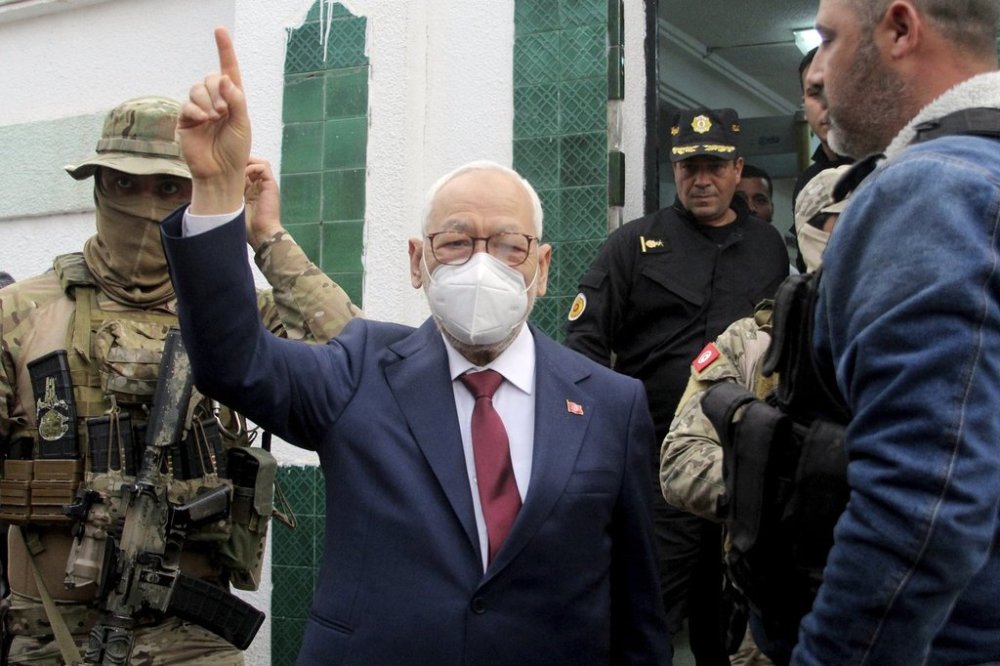A new report says Tunisia has dramatically expanded the use of politically motivated arrests
Advertisement
Read this article for free:
or
Already have an account? Log in here »
To continue reading, please subscribe:
Monthly Digital Subscription
$0 for the first 4 weeks*
- Enjoy unlimited reading on winnipegfreepress.com
- Read the E-Edition, our digital replica newspaper
- Access News Break, our award-winning app
- Play interactive puzzles
*No charge for 4 weeks then price increases to the regular rate of $19.00 plus GST every four weeks. Offer available to new and qualified returning subscribers only. Cancel any time.
Monthly Digital Subscription
$4.75/week*
- Enjoy unlimited reading on winnipegfreepress.com
- Read the E-Edition, our digital replica newspaper
- Access News Break, our award-winning app
- Play interactive puzzles
*Billed as $19 plus GST every four weeks. Cancel any time.
To continue reading, please subscribe:
Add Free Press access to your Brandon Sun subscription for only an additional
$1 for the first 4 weeks*
*Your next subscription payment will increase by $1.00 and you will be charged $16.99 plus GST for four weeks. After four weeks, your payment will increase to $23.99 plus GST every four weeks.
Read unlimited articles for free today:
or
Already have an account? Log in here »
Hey there, time traveller!
This article was published 16/04/2025 (230 days ago), so information in it may no longer be current.
Tunisia has dramatically expanded the use of politically motivated arrests and prosecutions to intimidate and silence critics, according to a Human Rights Watch report released Wednesday.
In what the group describes as a sweeping rollback of freedoms won during Tunisia’s 2011 revolution, authorities in recent years have targeted lawyers, judges, journalists and activists in a crackdown on critics of President Kais Saied.
“Not since the 2011 revolution have Tunisian authorities unleashed such repression,” Bassam Khawaja, the group’s deputy Middle East and North Africa director, said in a statement. “Saied’s government has returned the country to an era of political prisoners, robbing Tunisians of hard-won civil liberties.”

More than 50 people are currently detained on political grounds, Human Rights Watch said, citing a January tally. Of those, 22 are held arbitrarily, while 14 face charges that could carry the death penalty if convicted.
Tunisian authorities have not responded to the allegations detailed in the report, which draws a direct line between the judicial system and actions that Saied has taken to consolidate power since 2021.
At the time, citing the COVID-19 pandemic and domestic political crises, he suspended parliament, rewrote the constitution to consolidate his power and began to exert more control over the judiciary.
“The authorities’ stranglehold on the judiciary, following repeated attacks on its independence, raises serious concerns about fair trial guarantees for those detained,” the new report says.
Saied was reelected in a landslide last October after a campaign during which his most prominent challengers were imprisoned, kept off the ballot or jailed.
The report cites military courts and what it calls “overly broad and abusive accusations,” including charges of threatening state security, as among the tools used to suppress dissent. Politicians, lawyers, journalists and activists have been prosecuted for insulting the president or spreading so-called “fake news.”
Decree-Law 54, a cybercrime statute passed in 2022, has become a key instrument. At least 28 people — including nine journalists — have been prosecuted under the law, which mandates a minimum of five years in prison for anyone found guilty of spreading false information.
Those arbitrarily detained in Tunisia include both prominent figures and private citizens. Among them are Rached Tamboura, a calligraphy student imprisoned for graffiti denouncing Saied and his treatment of Black migrants; right-wing politician Abir Moussi; and numerous members and former officials of Ennahda, the Islamist party sidelined under Saied’s rule.
The most prominent detainee is the party’s former leader Rached Ghannouchi, arrested in 2023 and now facing multiple charges. His family told Human Rights Watch that some of his requests for routine medical care have been denied.
Also detained is Sihem Bensedrine, a lawyer and former head of Tunisia’s Truth and Dignity Commission, which investigated abuses under longtime autocrat Zine El Abidine Ben Ali. Bensedrine was charged and imprisoned under Saied.
Human Rights Watch called on Tunisia’s allies and partners — including the European Union — to review agreements with the country to ensure it complies with human rights obligations.

